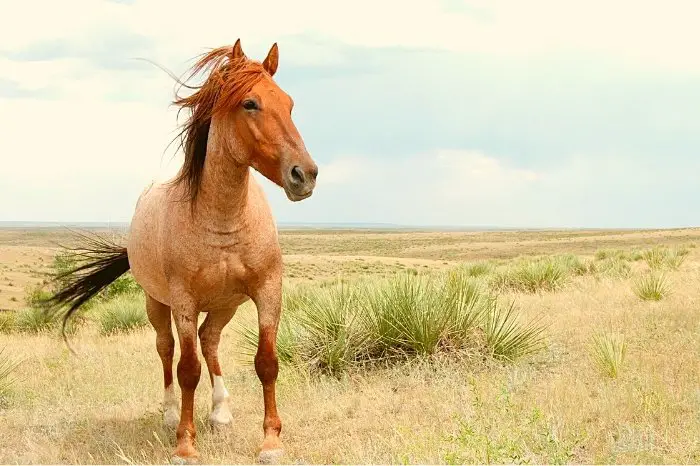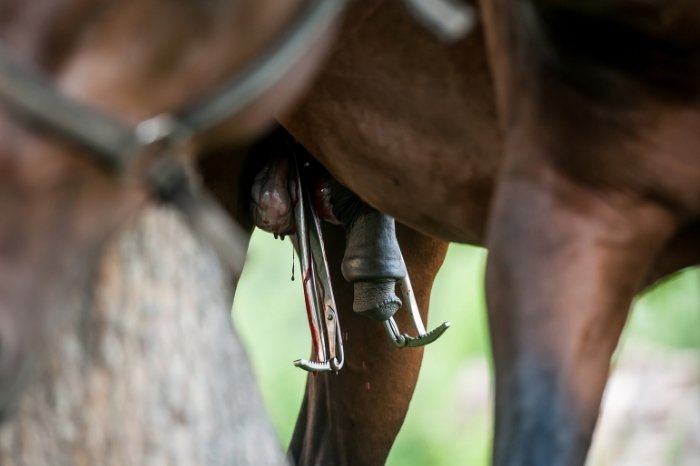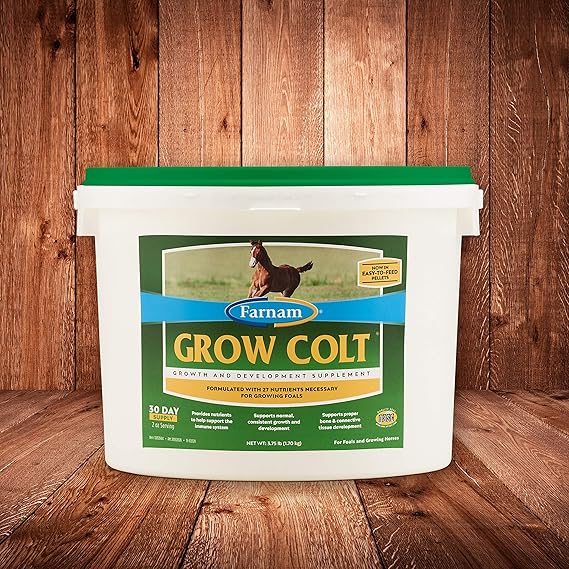Last Updated on January 11, 2022
It is very common for male horses to be gelded, and this procedure is performed on almost every colt at a young age. But have you ever wondered why it is necessary to geld a horse?
The process of neutering, or gelding, a male horse is relatively simple and is done for various reasons. Let’s take a look at why horses are gelded and what the process involves.
What Is A Gelding?
A gelding is a male equine that has had both of its testicles removed during a surgical procedure. The term gelding is used for all types of equines – horses, ponies, zebras, mules, and donkeys.
Also referred to as a neutered male, a gelding can survive happily without his testicles. There are no detrimental effects from this procedure. Many experts believe that the quality of life of the gelding is improved.
The testicles of the horse are part of the reproductive system and contribute to the production of sperm. Sperm is used during mating to impregnate a female horse, also known as a mare.

The testicles also play a role in the hormonal system of a male horse, and they produce a hormone called testosterone. Testosterone is essential for the functioning of the reproductive system.
This hormone is also required for mating activity, causing sexual arousal and ejaculation of the sperm. Testosterone also stimulates body growth, which is why you may hear of bodybuilders taking testosterone supplements!
Read more about What Does Hobbles Mean On A Horse?
Why Geld A Horse?
It is normal practice for all-male horses to be gelded except for those intended for breeding. Whereas a mare can only produce one foal per year, a stallion can impregnate hundreds of mares per year, particularly when artificial insemination is used. Therefore, it makes sense that only the best male horses are kept for breeding, and the rest are neutered.
There are also practical reasons why male horses are gelded. Stallions are notoriously difficult to handle and care for, and normally require a specialist yard and experienced handlers. It is very tricky to care for a stallion in a normal barn, as they will want to mate with the mares and possibly fight the other male horses!
Stallions are also very difficult to handle and can behave aggressively towards humans. In some cases, you will find a stallion that can be ridden and even compete against other horses without any problems. However, these instances are very rare.
Geldings are much calmer and less volatile than stallions and will live happily alongside other mares and geldings. They have no desire to reproduce, and will not be interested in mating with mares during the breeding season. The temperament of a gelding is gentle, kind, and enjoys spending time with humans.
Another reason to neuter, or castrate, a male horse is to prevent an overpopulation problem. In many countries around the world, there are too many horses as a result of overbreeding. Charities often intervene and run cut-price neutering clinics to help reduce the number of stallions.
It is good practice to only keep the best male horses as entire stallions. This could be a particularly fine example of a breed or one with proven athletic ability.
Check Out How Tall Should A Horse Fence Be?
What Is The Best Age To Geld A Horse?
Young male horses, also known as colts, are normally neutered as soon as the testicles have descended into the scrotum. This is normally at around one year old, or even sooner in some cases. At this age, the testicles have not started to produce testosterone and the colt should not have any stallion-like behaviors.
As the colt gets older, testosterone production will stimulate body growth. This causes the male horse to become more muscular and develop a cresty neck. At this point, the colt will also become sexually active and may develop aggressive behavior.
Farnam Grow Colt Growth & Development Supplement for Horses
Some horse owners like to leave gelding their colts until later in life, as they desire the bigger physical body of the stallion. However, if castrated when older, the gelding may still retain some of the behavioral characteristics of a stallion. The procedure of castrating an older stallion is also more risky and complicated.
Click here to know Why Do Horses Whinny?
How Is A Horse Gelded?
The procedure to geld a horse is relatively easy, with minimal risks to the animal. Horses are normally gelded in one of two ways – either by being fully anesthetized or under standing sedation. If the latter technique is performed, a local anesthetic will be injected into the testicles first.
Whichever way the procedure is carried out, the technique is the same. A small incision is made in the scrotum, and the testes and spermatic cord are removed through this incision. To prevent bleeding, the blood vessels may be either crushed or tied off with a surgical ligature.
The incisions themselves are normally left open and allowed to heal over time. This prevents infection from being trapped inside the surgical site. If the horse has been anesthetized for the procedure, you may find that the incision has been sutured closed.
The risks of castration are very low for a young, healthy horse. It can only be carried out once both testicles are fully descended, and if they do not descend fully then the procedure can be more challenging.

There are also some risks involved with anesthetizing a horse. This is why many veterinarians prefer to carry out castrations under standing sedation.
After the procedure, the gelding needs to be allowed to move around to reduce swelling of the surgical site. It is also important that the incisions are kept clean and free from flies, which is why it is more common to castrate horses in the spring or autumn.
Summary
So, as we have learned, a gelding is a male horse that has had its testicles removed during a surgical procedure. The reasons to geld a horse are that a gelding is no longer able to impregnate female horses. Geldings are also quieter and easier to handle than entire male horses. The process of gelding a horse is relatively simple and the vast majority of male horses are gelded.
We’d love to hear what you think about why people geld a horse! Have you ever seen a horse being gelded? Or do you have questions about how horses are gelded? Leave a comment below and we’ll get back to you!
Read more about Closed Vs Open Vs Semi-Open Castration In Horses?

Kate Chalmers is a qualified veterinary nurse who has specialized in horse care for the vast majority of her career. She has been around horses since she was a child, starting out riding ponies and helping out at the local stables before going on to college to study Horse Care & Management. She has backed and trained many horses during her lifetime and competed in various equestrian sports at different levels.
After Kate qualified as a veterinary nurse, she provided nursing care to the patients of a large equine veterinary hospital for many years. She then went on to teach horse care and veterinary nursing at one of the top colleges in the country. This has led to an in-depth knowledge of the care needs of horses and their various medical ailments, as well as a life-long passion for educating horse owners on how to provide the best possible care for their four-legged friends.
Kate Chalmers BSc (Hons) CVN, Dip AVN (Equine) Dip HE CVN EVN VN A1 PGCE

